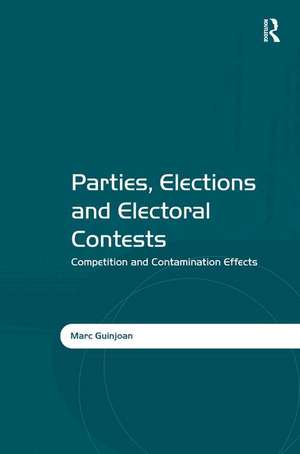Parties, Elections and Electoral Contests: Competition and Contamination Effects
Autor Marc Guinjoanen Limba Engleză Hardback – 28 aug 2014
Preț: 821.10 lei
Preț vechi: 1103.48 lei
-26% Nou
Puncte Express: 1232
Preț estimativ în valută:
157.12€ • 164.46$ • 130.77£
157.12€ • 164.46$ • 130.77£
Carte tipărită la comandă
Livrare economică 31 martie-14 aprilie
Preluare comenzi: 021 569.72.76
Specificații
ISBN-13: 9781472439086
ISBN-10: 1472439082
Pagini: 192
Dimensiuni: 156 x 234 mm
Greutate: 0.52 kg
Ediția:1
Editura: Taylor & Francis
Colecția Routledge
Locul publicării:Oxford, United Kingdom
ISBN-10: 1472439082
Pagini: 192
Dimensiuni: 156 x 234 mm
Greutate: 0.52 kg
Ediția:1
Editura: Taylor & Francis
Colecția Routledge
Locul publicării:Oxford, United Kingdom
Recenzii
’This book provides us with a novel theory to resolve a well-known puzzle in comparative politics: why do parties compete in races they cannot win? It includes valuable new insights to understand strategic party behaviour. This book can inform policy makers and electoral engineers alike about the consequences of overlapping arenas in a system of multi-level governance.’ Thomas Gschwend, University of Mannheim, Germany ’This book constitutes an impressive empirical and theoretical contribution to a better understanding of the logic behind political parties’ decisions to run in non-viable electoral districts under a stable Duvergerian equilibrium. The author shows that the presence of so called contamination effects between different electoral districts mostly occurs due to the presence of multi-tiered electoral contexts where political arenas overlap. This book is a must for experts in electoral systems, party systems and comparative politics in general.’ Mariano Torcal, Universitat Pompeu Fabra, Spain
Notă biografică
Marc Guinjoan is doctor in Political Sciences at the Universitat Pompeu Fabra. His research interests are focused on electoral systems and party strategies. He is also interested in political behaviour, as well as in decentralisation processes and in nationalism. He has published articles in international journals as Social Sciences Quarterly, Nations and Nationalism or Regional and Federal Studies, as well as some book chapters and journal articles in reviews in Catalan and Spanish, including a recent book on Catalan politics. He is currently researcher for the Making Electoral Democracy Work project.
Cuprins
Chapter 1 Introduction; Chapter 2 The Duvergerian Gravity and the Emergence of Contamination Effects; Chapter 3 Contamination Effects: The Institutional and Sociological Incentives to Compete; Chapter 4 Contamination Effects: The Organisational Incentives to Compete; Chapter 5 Qualitative Empirical Analysis: The Organisational Incentives to Compete; Chapter 6 Quantitative Empirical Analysis: The Institutional and Sociological Determinants to Compete; Chapter 7 Conclusions;
Descriere
According to the Duvergerian theories, in the long run, only viable parties are expected to stand for elections. Non-viable parties should join a pre-electoral coalition with another party or withdraw from competition entirely. Why then do non-viable political parties throughout the world systematically continue presenting candidates? This book argues that political parties will take advantage of their viability in an arena to present candidacies in other arenas where they do not have chances to become viable.
